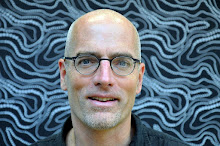It was very strange to see BoingBoing promoting this hackneyed critique of contemporary art by "artist" and illustrator Robert Florczak or Prager "University." More on the scare quotes in a second. Why strange? Maybe it's the blender effect of Twitter which constantly recirculates the old as if it's new and the new as if it's already been around the block so often that by the time you get to it it's old news. Maybe it's because former WIRED editor Chris Anderson retweeted it with the following observation: "Well argued and brave. Plus fun prank on his grad students." Really? Let's start with the last bit first. The prank that Anderson thought was so fun: giving his students a close up photo of a painting he claims to be by Jackson Pollock (but is actually a close up of his studio smock) and making them explain why it's so great, so that he can then humiliate them by revealing the true source of the image. This raises some interesting questions about his grad students (at Prager University?), who seemed to think that this:
was pretty much indistinguishable from this:
Ok, I get it, squiggles are squiggles, but these are supposed to be graduate students in art (history? studio art?) of some kind. Which makes one wonder what kind of university this is. Apparently it's the online creation of conservative talk show host Dennis Prager -- a venue for right-wing, low budget Ted-type Talks devoted to topics like "Feminism vs. Truth" and "The War on Boys," and why Christians are the "Most Persecuted Minority." Maybe the inability to tell the difference between these two images helps explain why Florczak, who paints things like this:
seems to think that he's working in the tradition forged by the painters of images like this:
and this:
Rather than the tradition forged by the creators of images like this:
and this:
Florczak's claims seem to have something to do with technique and skill -- things that, for example, both Kenny G. and John Coltrane have mastered, but that don't make them the same type of artist. That this distinction is lost on the likes of Anderson and BoingBoing's Mark Frauenfelder (another former WIRED editor) is an indication of the cultural confidence of the tech world, in which expertise becomes fungible and the perpetual vindication of financial success a kind of all-purpose cultural qualifier.








No comments:
Post a Comment